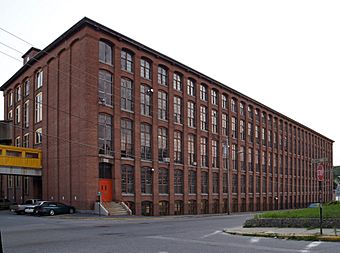Bigelow Carpet Mill facts for kids
Quick facts for kids |
|
|
Bigelow Carpet Mill
|
|
 |
|
| Location | Union St. at High St., Clinton, Massachusetts |
|---|---|
| Area | 9.5 acres (3.8 ha) |
| Built | 1847 |
| NRHP reference No. | 78000467 |
| Added to NRHP | December 22, 1978 |
The Bigelow Carpet Mill is a very old factory complex in Clinton, Massachusetts. It was built in 1847 and grew much larger over the years, until 1922. This huge factory was one of the first in the world to use machines to make carpets. It was started by two brothers, Horatio and Erastus Bigelow. The mill is now a special historic place, listed on the National Register of Historic Places since 1978.
What is the Bigelow Carpet Mill?
The Bigelow Carpet Mill complex is located just south of downtown Clinton. It sits between Union Street, Pleasant Street, and School Street. The complex has six buildings made of brick. They are between two and five stories tall. Some of the buildings have a fancy style called Italianate. You can see this in their round-arch windows and decorative brickwork. They also have cool towers that look like castles. Inside, the buildings have strong wooden beams.
How Did the Bigelow Carpet Mill Start?
The story of this mill began in 1847. That's when Erastus Bigelow invented new machines to make carpets. He got many patents, which are like special rights for his inventions. In 1849, Erastus and his brother Horatio started making a type of carpet called Brussels tapestry. They used a building that was already on this spot. That first building is gone now. The oldest building still standing was built by the Bigelow brothers in 1855.
The Bigelow Carpet Company became a very important carpet maker in the late 1800s. The factory complex kept growing to make more and more carpets. In the 1880s, some of the older buildings were updated. This gave the whole complex its unique look from that time.
The mill closed down in the 1930s. For many years, the buildings were empty or used for storage. But in the 1970s, they started to be used by industries again. Today, the complex is the main office for Nypro. This company designs and makes things like medical devices.
 | Chris Smalls |
 | Fred Hampton |
 | Ralph Abernathy |



